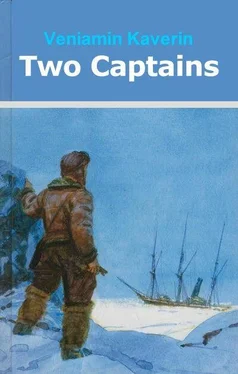"Yes, I wanted to part you, because this love had given you such marvellous happiness all your life. I was sick with envy, thinking that you loved simply out of love, whereas my love had the extra spur in that I wanted to take her away from you. You may think it funny, my talking to you about love. But the contest is over, I have lost, and what is this humiliation to me now compared with the fact that you are alive and that fate had played a trick on me again?"
The telephone rang in the hall. Vyshimirsky answered it. "Yes, he's in. Who's that speaking?"
He did not call Romashov, however.
"Then the war broke out. I joined up. I didn't have to, I was reserved. If I was killed, all the better! But secretly I was hoping that you'd be killed. Near Vinnitsa I was lying in a barn when an airman came in and stopped in the doorway, reading a newspaper. 'What a fine bunch o' lads!' he said. 'A pity, they've gone up in smoke.' 'Who?' 'Captain Grigoriev and his crew.' I read that paragraph a thousand times. I learnt it by heart. A few days later I met you in the hospital train."
It was very odd, the way he was seeking my sympathy, as it were, for the fact that, contrary to his hopes, I was still alive. He was so carried away, however, that he did not see the absurdity of his attitude.
"You know the rest. Even in the train I was struck by the fact that you somehow didn't seem to be thinking about Katya. I saw that you were tormented by all the filth and confusion, but there again you were yourself, you would have given your life to prevent that retreat. For me it merely meant that you had shown yourself again to be the better man."
He fell silent. There might never have been that aspen wood, the heaps of wet leaves and the woodstack which prevented me from swinging my arm back, or myself lying on the ground, propped up on my hands, trying not to shout to him: "Come back, Romashov!"- as he sat there before me, a dignified gentleman in a light grey suit. The desire to strike him with my pistol was so great that my arms even began to ache.
"Yes, a profound thought," I said. "Incidentally, will you please sign this paper."
While he was confessing I had been writing a "deposition", that is, a brief history of how the search-party had been torpedoed. It was torture for me, as I am a poor hand at composing official papers. But I think I made a good showing with the "Deposition of M.V. Romashov", perhaps because it contained such phrases as: "Having basely deceived the leadership of the Northern Sea Route Administration" etc.
Romashov quickly glanced through the paper.
"All right," he muttered, "but first I must explain to you-"
"First, sign, you'll do your explaining afterwards."
"But you don't know-"
"Sign, you rat!" I said in such a voice that he recoiled in terror, and his teeth began to chatter in a sort of slow, reluctant manner.
He signed and flung the pen down with a savage gesture.
"You ought to be grateful to me, but instead you intend to take advantage of my frankness. Ah well!"
"Yes, I do!"
He looked at me. How deeply at that moment he must have regretted that he had not finished me off in the aspen wood!
"I returned to Moscow," he continued, "and immediately set about getting a transfer to Leningrad. I travelled by way of Lake Ladoga. The Germans were sinking our ships, but I made it, and just in time, thank God," he added hastily. "In another day, at most two days, I would have had to arrange her funeral."
This may have been the truth. When Vyshimirsky was telling me about Romashov having been in Leningrad, I recollected the story of the ginger major which the yardkeeper and her children had told me. "She dig out ginger man, he have bread. Big sack, carry himself, not let me." It was not this that worried me. Romashov might have talked Katya into believing that I had been killed-in battle, of course, and not in the aspen wood.
"And there I was in Leningrad. You can't imagine what it was. I got a bread ration of three hundred grams, and brought half of it to Katya. At the end of December I managed to get some glucose, and I bit all my fingers while I was taking it to Katya. I dropped beside her bed, and she said: 'Misha!' But I didn't have the strength to get up. I saved her," he repeated gloomily, as though the fearful thought that I might not believe him had struck him again. "And if I didn't die myself it was only because I knew that she and you needed me." "I too?" "Yes, you too. Skovorodnikov had written to her that you'd been killed. She was half-dead with grief when I arrived. You should have seen what happened to her when I told her I had seen you! I realised at that moment how pitiful!-Romashov brought this out in such a full, loud voice that there even came a thud from the hallway, as if Vyshimirsky had fallen off his chair-"how pitiful I was in the face of this love. At that moment I bitterly regretted having wanted to kill you. It was a false step. Your death would not have brought me happiness."
"Is that all?"
"Yes, that's all. In January they sent me to Khvoinaya. I was away a fortnight. I brought meat, but the flat was already empty. Varya Trofimova-I expect you know her-had sent Katya away by plane."
"Where to?"
"To Vologda-I found that out definitely. And from there to Yaroslavl." "Who did you make inquiries of at Yaroslavl?" "The evacuation centre. I know the man in charge." "Did you get a reply?"
"Yes. But it was only to say that she had passed through the evacuation centre and had been sent to a hospital for Leningraders."
"Show me."
He found the letter in his desk and handed it to me. "Vspolye Station," I read. "In reply to your inquiry…"
"Why Vspolye?"
"The evacuation centre is there. It's two kilometres outside Yaroslavl."
"Is that all now?" "Yes."
"Now listen to me, then," I said, fighting for self-control. "I can't forgive, or not forgive you, whatever you may have done for Katya. After what you did for me this is no longer a personal quarrel between us. You weren't quarrelling with me when you wanted to finish me off and left me, a badly wounded man, in the wood to die. You were committing a military offence, a dastardly crime for which you will be tried as a scoundrel who violated his oath."
I looked him squarely in the eye and was amazed. He was not listening to me. Somebody was coming up the stairs, two or three people judging by the footfalls which echoed hollowly on the staircase. Romashov looked about him uneasily and stood up. There came a knock at the door, then a ring.
"Shall I open?" Vyshimirsky asked from behind the partition.
"No!" Romashov shouted. "Ask who it is," he added quietly, as though collecting himself, and walked across the room with a light, almost dancing tread.
"Who's there?"
"It's from the house management, open the door."
Romashov gave a sharply indrawn breath.
"Tell them I'm not at home."
"I didn't know. Somebody phoned and I said you were at home."
"At home, of course," I said loudly.
Romashov threw himself upon me and seized my arms. I pushed him away. He squealed, then followed me out into the hallway and took up the same position as before, between the wall and the
wardrobe.
"Just a minute," I said. "I'll open the door."
Two men came in-an elderly one, who was evidently the house manager, judging by the dour, businesslike expression of his face, and that same young man with the cool manner and the smart cap whom I had seen in the house manager's office. The young man first looked at me, then, unhurriedly, at Romashov.
"Citizen Romashov?"
"Yes." Vyshimirsky's teeth chattered so loudly that everyone looked
round at him. "Weapons?" "I have none," Romashov answered, almost unruffled. Only a
vein throbbed in his otherwise impassive face.
Читать дальше












